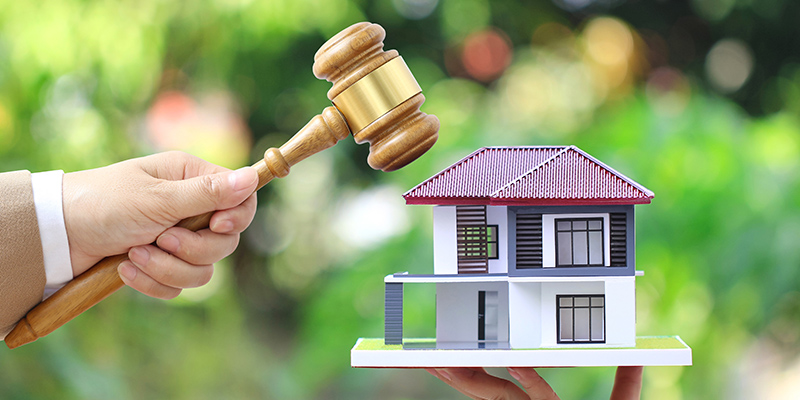HOA Lien: Understanding Its Impact and How to Avoid It

An HOA lien can strain a homeowner's finances and even jeopardize ownership. For many homeowners associations, it is one way to penalize grave violations or collect unpaid dues to a certain degree. People living in HOA communities should know how liens work and what they can do to address or avoid them altogether.
Browse By Category
Sign up for Our Newsletter
An HOA lien can strain a homeowner’s finances and even jeopardize ownership. For many homeowners associations, it is one way to penalize grave violations or collect unpaid dues to a certain degree. People living in HOA communities should know how liens work and what they can do to address or avoid them altogether.
Understanding HOAs and HOA Fees
To fully understand HOA liens and their impact, it is first important to know what homeowners associations are. An HOA is a planned development community governed by a set of covenants, bylaws, and rules. Residents in such communities usually enjoy common areas and amenities. Maintaining and operating these common areas, though, takes funds—and this is where HOA fees come in.
Residents are required to pay regular fees or dues to the association. The HOA can then use the funds collected to pay for the community’s various maintenance and upkeep expenses. Occasionally, an HOA may also levy special assessments.
When a homeowner fails to pay their dues and assessments, the HOA can take several actions. These actions may include penalties depending on state laws and the HOA’s governing documents. Some penalties may include charging late fees and interest, suspending a member’s privileges, filing a lawsuit, and placing a lien on the home.
What Is an HOA Lien?
An HOA lien is a legal right that automatically attaches to property once the homeowner becomes delinquent on their dues and assessments. More often than not, the lien an HOA has on a home attaches on the assessment’s due date or once the HOA files a notice of lien in the land records.
Other than the lien itself, a delinquent may also find themselves liable for other charges. Depending on the CC&Rs, these charges can include unpaid dues, late charges, collection costs (such as attorneys’ fees), fines, and interest.
Can an HOA Put a Lien on My House?
Generally, yes. An HOA can place a lien on a homeowner’s property. However, this authority ultimately depends on what state laws and the HOA’s governing documents allow.
Some states require associations to record the lien with the county land records, while others don’t have this requirement. Sometimes, an HOA can put a lien on a home for unpaid fines due to repeated violations. However, again, this can vary depending on the state and the governing documents of the community.
When you have an HOA lien on property, you need to pay your dues owed fully. After you’ve satisfied your debts, the association can file an HOA lien release document and have it detached from your property.
What Happens If You Don’t Pay the Lien?
 Many homeowners’ top concern when facing a lien is the possibility of foreclosure. In most cases, an HOA can start foreclosure proceedings right after attaching a lien to the property. This means owners may lose their homes because of unpaid association dues. However, the HOA should use this as a last resort to address delinquent debts.
Many homeowners’ top concern when facing a lien is the possibility of foreclosure. In most cases, an HOA can start foreclosure proceedings right after attaching a lien to the property. This means owners may lose their homes because of unpaid association dues. However, the HOA should use this as a last resort to address delinquent debts.
Other than foreclosure, homeowners may face other issues related to an HOA lien. A lien adds stress to your life while possibly straining the positive relationships you have with your neighbors. It can also affect your credit score. With a lien, homeowners will find it more difficult to sell or refinance their home, with your property value plummeting.
The Negative Impact of Liens on an HOA
An HOA lien on house has negative implications for both the homeowner and the HOA. Filing liens costs the association money in legal fees. Additionally, if the HOA decides to start the foreclosure proceedings, it will also need the help of an attorney. Ultimately, the HOA may need to spend more money on attaching the liens than what it earns from back dues.
To avoid this scenario, an HOA board should proactively collect outstanding fees from homeowners. Having a clear and strict policy for dues collection should be imperative. While board members should show sympathy to owners with financial problems, making exceptions is not always a good idea and will only backfire in due time. Instead, an HOA can offer payment plans. However, remember that it’s not a good idea to allow owners to frequently take advantage of such plans.
How Homeowners Can Avoid an HOA Lien
The best way for homeowners to avoid having a lien placed is to keep up with HOA fees. Missing payments, whether intentionally or not, will force the HOA to take action, which includes attaching a lien or starting foreclosure proceedings.
If you face violation fines, you should settle them on time and in full. Not all homeowners associations can place a lien and start foreclosure based on fines alone. However, residents need to remember that some have that ability.
Of course, there are instances when homeowners struggle with financial issues, compromising their ability to pay fees regularly. If this happens, these residents need to communicate with their HOA board. While it may feel unpleasant to share financial problems with people who are essentially your neighbors, it helps ease some of the burden.
If you are having financial difficulties, the HOA board may offer you an interest-free payment plan. This will allow them to settle outstanding debts without worrying about the possibility of losing their property. As a homeowner, you must document these agreements and keep records of all invoices, receipts, and important documents.
For HOA boards, limit how often payment plans are offered. Most HOAs have rules that limit payment plans to once per homeowner, and some associations don’t offer them at all. However, states have regulations requiring HOAs to offer payment plans. For example, in Colorado, HOAs must offer a 6-month payment plan for struggling homeowners (Section 38-33.3-316.3).
Can a HOA Foreclose Your Home with a Lien?
After a lien attaches to a homeowner’s property, an HOA’s next step is foreclosing on it. A homeowners association lien foreclosure can typically happen even if there is an existing mortgage on the property.
There are two ways an HOA can foreclose on a home: judicially and nonjudicially. The manner in which a particular HOA can foreclose on a home depends on state laws and the association’s governing documents.
- Judicial Foreclosures. With judicial foreclosures, the HOA needs to file a lawsuit and seek a judgment from the court. This judgment may allow the association to sell the home to satisfy the lien and settle the owner’s debt.
- Nonjudicial Foreclosures. With nonjudicial foreclosures, the HOA doesn’t need to go to court for foreclosure proceedings. Instead, the HOA must follow specific procedures according to state laws and the governing documents.
However, the HOAs need to know that certain state laws may impose HOA foreclosure requirements. In California, for example, Civil Code Section 1367.4 stipulates that an HOA can only foreclose on a home if the delinquent fees are equal to or above $1,800 or if the owner has remained delinquent for at least 12 months.
Effect of an HOA Lien on a Mortgage
Typically, state laws or an HOA’s governing documents have provisions that outline the priority of an HOA lien over all other liens recorded after recording the CC&Rs. The only exception is the deed of trust or first mortgage recorded before the delinquency date. In such cases, the first mortgage remains intact even after the HOA foreclosed the property. Of course, this will not apply to an HOA super lien, which will be discussed further below.
Following the foreclosure, the borrower or homeowner remains responsible for the mortgage of the property. While the property is foreclosed, they are still the ones who entered the agreement with the lender. The HOA doesn’t have the obligation to pay the first mortgage holder, even after it assumes ownership of the property following foreclosure.
Typically, borrowers stop paying the first mortgage holder following an HOA foreclosure. When this happens, the HOA may take several different steps. For one, it can pay the first mortgage holder to stop that party from foreclosing on the property. This is not the usual approach a lot of HOAs take. After all, an HOA isn’t responsible for the mortgage payment.
As an alternative, the HOA may allow the first mortgage holder to foreclose. Doing so will turn over the ownership to someone else who will subsequently join the association and be responsible for HOA fees.
What Happens to the Second Mortgage Lien?
This type of mortgage lien sits lower on the priority list, below HOA liens. After an HOA forecloses on property, all other junior liens, such as the second mortgage, become void. With this, such liens will detach from the property title.
However, the borrower is still responsible for paying the mortgage holder. With second mortgages, the borrower enters an agreement with the lender and signs a promissory note. Given this, the second mortgage holder may file a lawsuit against the borrower to satisfy the debt if they stop making payments.
What Is an HOA Super Lien?
In most cases, a homeowners association lien holds priority over all other liens and encumbrances, other than a first mortgage, in cases of an HOA foreclosure. However, some states allow an HOA to have a super lien. In super lien states, the lien is the top priority, even over a first mortgage. Do note that there are limitations to this, which depend on the state.
If an HOA has super lien status, the money from a foreclosure sale will first go towards satisfying the delinquent dues. These dues are typically capped at a specific amount or several months’ worth of unpaid HOA fees. Then, the first mortgage holder will be paid using the proceeds from the foreclosure sale. If any proceeds are left, they will go to junior lienholders based on priority.
How an HOA Files a Lien
State laws and the HOA’s governing documents stipulate the process of filing a lien. In most cases, the process follows the steps below.
- Notice. The HOA must notify the homeowner of their unpaid dues and give them a chance to address them. Usually, the HOA will send several notices via mail and/or email. The HOA will also try to reach out to the homeowner by calling them on the phone to collect the unpaid dues.
- Demand Letter. If notices don’t work, the HOA may send the homeowner a demand letter. This letter should include how much the owner owes to the HOA and warn of the HOA’s plan to file a lien if the debt isn’t addressed within a given timeframe.
- Filing the Lien. If the homeowner doesn’t attempt to correct the issue, the HOA will then file the lien. The lien is usually filed with the county recorder’s office.
- Foreclosure. After discovering the lien filing, delinquent homeowners usually try to settle their unpaid dues. In some cases, however, owners remain unfazed. For these, the HOA’s last step is to initiate foreclosure proceedings in an attempt to satisfy the owner’s debts to the association.
Do HOA Liens Expire?
Yes, there is an HOA lien statute of limitations. Depending on state laws and the governing documents, an HOA lien can expire. The HOA usually needs to take action to enforce the lien within a specified timeframe, such as foreclosing on it. If they don’t, the lien becomes void and unenforceable.
How to Redeem Your Home After an HOA Foreclosure
 In some states, homeowners have a right of redemption after a foreclosure sale. This means you can repurchase your home even after the HOA forecloses it.
In some states, homeowners have a right of redemption after a foreclosure sale. This means you can repurchase your home even after the HOA forecloses it.
In California, the law gives you 90 days in nonjudicial foreclosure cases. During this redemption period, you can regain property ownership if you pay the lien amount plus any fees, costs, and permitted charges. If the buyer made repairs to your home, you must reimburse them if you want to redeem your property.
Meanwhile, in Texas, the law gives a 180-day redemption period from the date the HOA sends the written notice of sale.
This right of redemption period may vary greatly depending on the state. Some states don’t offer them at all.
Does an HOA Lien and Foreclosure Affect Your Credit Score?
Theoretically, an HOA lien and foreclosure can negatively affect your credit score. Many HOAs don’t file delinquent dues reports with credit reporting bureaus. Even for cases that don’t reach foreclosure, your credit score can still tank if your HOA reports your account to a collection agency. These agencies might then report the debt and lien to credit reporting bureaus.
However, if you lose your home through an HOA foreclosure, your credit score will most likely plummet. While the HOA may not report the foreclosure, the record will still appear in your credit history. This is because judicial foreclosures need court filings, which are records that the public can access.
On the other hand, nonjudicial foreclosures don’t need to go through court. They still, however, involve recording a notice in the land records. Such records are also accessible to the public, so credit bureaus will find out sooner or later.
However, it is unclear how badly it can impact your credit score. Based on general estimates, your FICO score might go down by at least 100 points, but this can still vary from person to person. In these cases, the higher your credit score before the foreclosure, the bigger the impact afterward.
But how long does a lien stay on your credit report? Like many other negative reports for your credit score, an HOA property lien may stay for up to seven years since its original filing.
Low credit scores make it more difficult to apply for new loans or to secure credit. Given this, you may find it harder to buy a home, as lenders check credit scores as part of their due process. If your score is below a threshold, you might get turned down for a loan or face high interest rates if you manage to qualify for one.
The Best Solution
It is troublesome to deal with an HOA lien, both for the homeowner and the HOA. To avoid this, both parties need to do their best to avoid resorting to it. Homeowners need to pay their dues on time fully. On the other hand, HOAs should also enact a strict collection policy and exhaust all collection efforts in cases of delinquencies, only using liens and foreclosures as a last resort.
An HOA management company can help your HOA board navigate the ins and outs of liens. Look for the best one in your area using our online directory!
RELATED ARTICLES:
- Everything You Should Know About HOA Fines
- HOA Payment Plans: Should These Be Offered To Late Payers?
- Are Your HOA Fees Too High? Here’s How To Lower HOA Fees
Trending Now
Related Article
Sign up for Our Monthly Newsletter
Sign up below for monthly updates on all HOA Resource















